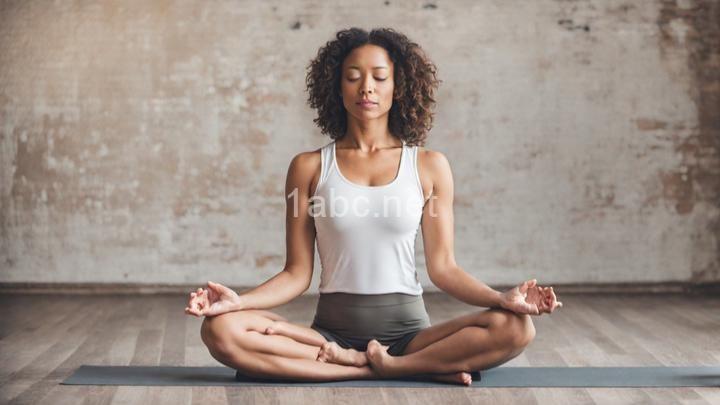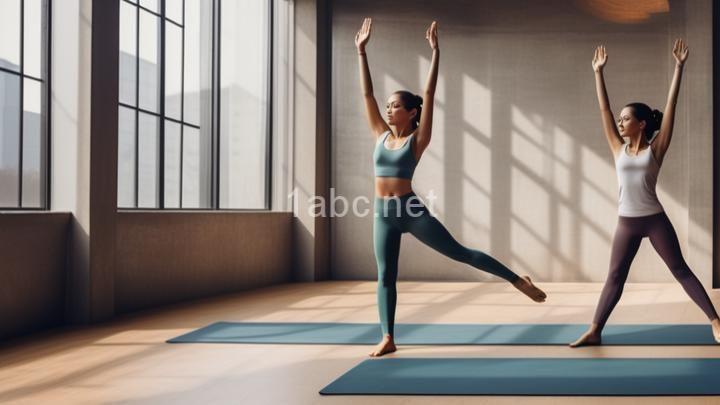Achieving Inner Peace: How Yoga and Mindfulness Meditation Can Help Reduce Stress and Anxiety

Introduction:
Welcome to a world that is constantly moving, where stress and anxiety have become all too familiar. In this fast-paced society, finding inner peace has become more important than ever. We live in a world that demands our attention 24/7, leaving us feeling overwhelmed and exhausted. But what if there was a way to find calm amidst the chaos? What if we could reduce our stress and anxiety and cultivate a sense of inner peace? Enter yoga and mindfulness meditation.
Before we dive into the world of yoga and mindfulness, let me share a startling statistic with you. According to the American Psychological Association, stress levels have been on the rise for the past decade, with 77% of adults reporting physical symptoms of stress and 73% experiencing psychological symptoms. These numbers are alarming, highlighting the urgent need for effective coping mechanisms.
In this blog post, we will explore the power of yoga and mindfulness meditation as tools for reducing stress and anxiety. We will delve into the science behind these practices and discuss practical ways to incorporate them into our daily lives. So, grab a cup of tea, find a comfortable seat, and let's embark on a journey towards inner peace together.
I. Understanding Stress and Anxiety:
To understand how yoga and mindfulness meditation can help reduce stress and anxiety, it is essential to first understand what these terms mean. Stress is a natural response to the demands of life, whether it be work, relationships, or personal challenges. It can manifest in various ways, such as physical tension, irritability, or difficulty concentrating. Anxiety, on the other hand, is a feeling of unease, often accompanied by worry or fear. It can be triggered by specific situations or generalized, impacting our daily lives.
The negative impact of stress and anxiety on our physical and mental well-being cannot be understated. Prolonged exposure to stress hormones can lead to a weakened immune system, heart problems, and even mental health disorders. Anxiety, if left unaddressed, can hinder our ability to function, affecting our relationships, work performance, and overall quality of life.
Because of these detrimental effects, it is crucial to find healthy and effective ways to manage stress and anxiety. This is where yoga and mindfulness meditation come in.
II. The Power of Yoga:
Yoga is not just about touching your toes or twisting your body into impressive shapes. It is a holistic practice that combines physical movement, breath control, and mental focus. By synchronizing these elements, yoga creates a powerful tool for stress reduction.
One of the primary benefits of yoga is increased flexibility, both physically and mentally. As we move through different poses, we release tension and tightness in our muscles, promoting physical relaxation. This physical release then translates to mental and emotional relaxation, as we let go of stress and negative emotions stored in our bodies.
Another significant benefit of yoga is its ability to improve our relaxation response. In our busy lives, our bodies are often in a state of constant activation, ready to fight or flee. Yoga activates our parasympathetic nervous system, responsible for the rest-and-digest response, allowing us to experience a deep sense of relaxation and calm.
Moreover, yoga enhances the mind-body connection. By bringing awareness to our breath and sensations in our body, we become more present and grounded. This increased awareness helps us recognize the early signs of stress and anxiety, empowering us to take proactive steps to manage them.
To target stress relief, there are specific yoga poses and sequences that can be particularly beneficial. Some of these poses include:
- Child's Pose (Balasana): This gentle forward bend stretches the back and relaxes the mind, allowing for deep relaxation.
- Standing Forward Fold (Uttanasana): This pose releases tension in the back and hamstrings, while also calming the nervous system.
- Legs Up the Wall (Viparita Karani): By elevating the legs, blood flow is redirected towards the heart, promoting relaxation and reducing stress.
- Corpse Pose (Savasana): This final relaxation pose allows the body and mind to fully let go, experiencing profound relaxation.
III. Embracing Mindfulness Meditation:
While yoga incorporates mindfulness, mindfulness meditation takes it to a deeper level. Mindfulness meditation is the practice of being fully present in the moment, without judgment. It involves observing our thoughts, emotions, and sensations with curiosity and acceptance.
Mindfulness meditation has been extensively studied and has shown significant benefits for stress reduction and emotional well-being. It cultivates awareness, enabling us to notice the patterns of our mind and recognize when we are caught in a cycle of rumination or worry. By becoming aware of these patterns, we can interrupt them and choose more helpful thoughts and behaviors.
One of the essential aspects of mindfulness meditation is non-judgmental awareness. Often, we can be our harshest critics, berating ourselves for perceived failures or shortcomings. Mindfulness meditation teaches us to observe our thoughts and emotions without attaching judgment to them, allowing us to cultivate self-compassion and kindness.
There are various mindfulness techniques you can try to incorporate into your practice. One of the most common techniques is focused breathing, where you direct your attention to the sensation of your breath as it enters and leaves your nostrils. Another technique is the body scan, where you systematically bring your attention to different parts of your body, noticing any sensations or areas of tension.
IV. The Synergy of Yoga and Mindfulness Meditation:
While yoga and mindfulness meditation are powerful practices on their own, their combination creates a synergistic effect. By practicing both disciplines together, we can enhance their individual benefits and create a more profound sense of calm and well-being.
Yoga prepares the body and mind for mindfulness meditation. The physical movement and breath control in yoga help release tension and restlessness in the body, making it easier to sit still and focus during meditation. The increased mind-body connection developed through yoga also aids in deepening our meditation practice, as we become more attuned to our internal experiences.
Mindfulness meditation, on the other hand, enhances the mental focus and concentration required in yoga. By cultivating mindfulness off the mat, we can bring that same focused awareness to our yoga practice, making it a more mindful and transformative experience.
Numerous personal testimonies and research studies support the synergy of yoga and mindfulness meditation. People who regularly practice both disciplines report reduced stress, improved emotional well-being, and an increased sense of inner peace. Research has shown that this combination can lead to decreased levels of the stress hormone cortisol, improved sleep quality, and enhanced cognitive function.
V. Incorporating Yoga and Mindfulness into Daily Life:
Now that we understand the benefits of yoga and mindfulness meditation, the question arises: How can we incorporate these practices into our busy lives? The good news is that it is possible, even with the most hectic schedules.
One practical tip is to create a designated space for your practice. It can be a corner of your living room or a spare room dedicated to yoga and meditation. Having a designated space creates a sense of sacredness and makes it easier to establish a routine.
Setting realistic goals is also crucial. Start small and build from there. It can be as simple as committing to five minutes of yoga or meditation every day. Consistency is key, even if it's just a short practice. Remember, it's better to do a little bit consistently than to do a lot sporadically.
Guided apps or videos can be helpful for those who prefer structure or guidance in their practice. There are numerous resources available online that offer guided yoga classes and mindfulness meditations, making it easier to practice from the comfort of your own home.
Finally, remember that finding inner peace is a journey, not a destination. It requires ongoing commitment and self-compassion. Some days, your practice may feel effortless, while other days, it may feel challenging. Embrace both the highs and lows, knowing that every moment spent in self-care is a step towards inner peace.
Conclusion:
In a world that never stops, finding inner peace is a radical act of self-care. Stress and anxiety have become all too familiar, with detrimental effects on our physical and mental well-being. Yoga and mindfulness meditation offer powerful tools for reducing stress and anxiety, allowing us to cultivate a greater sense of calm and well-being in our lives.
We have explored the science behind these practices, discussing the benefits of yoga for stress reduction and the transformative power of mindfulness meditation. By combining yoga and mindfulness, we can enhance their individual benefits and create a synergistic effect that brings us closer to inner peace.
Incorporating yoga and mindfulness into daily life may feel challenging at first, but with commitment and consistency, it becomes an integral part of our routine. Remember, every small effort counts and brings us closer to our goal of inner peace.
So, take a deep breath, roll out your yoga mat, and embark on this journey towards inner peace. You deserve it.
FREQUENTLY ASKED QUESTIONS
What is Achieving Inner Peace: How Yoga and Mindfulness Meditation Can Help Reduce Stress and Anxiety?
Achieving Inner Peace: How Yoga and Mindfulness Meditation Can Help Reduce Stress and Anxiety is a book that explores the benefits of yoga and mindfulness meditation in calming the mind, reducing stress, and alleviating anxiety. It delves into the principles and practices of yoga and mindfulness, discussing how they can be used as powerful tools for achieving inner peace. The book provides practical guidance on incorporating yoga and mindfulness into daily life, including various techniques and exercises. It emphasizes the importance of self-care, self-awareness, and cultivating a present-moment focus as ways to enhance overall well-being and mental tranquility. By incorporating yoga and mindfulness into one's lifestyle, individuals can develop greater resilience to stress and experience a deeper sense of inner calm.
How does yoga contribute to reducing stress and anxiety?
Yoga has been known to contribute to reducing stress and anxiety through several mechanisms:
- Physical relaxation: The physical postures (asanas) and deep breathing exercises (pranayama) practiced in yoga help relax the body, release muscle tension, and reduce physical symptoms of stress.
- Mindfulness and awareness: Yoga encourages focusing on the present moment and cultivating awareness of thoughts, feelings, and bodily sensations. This mindfulness practice helps individuals better manage stress triggers and respond to them in a calm and controlled manner.
- Stress hormone regulation: Regular yoga practice has been shown to reduce the production of stress hormones such as cortisol and increase the release of mood-enhancing hormones like endorphins. This hormonal balance contributes to a sense of calm and well-being.
- Improved sleep quality: Many people with stress and anxiety struggle with sleep disturbances. Yoga promotes better sleep by increasing relaxation, reducing racing thoughts, and improving overall sleep quality.
- Enhanced self-care: Engaging in yoga practice encourages self-care and self-compassion. It provides individuals with a dedicated time and space to focus on themselves, fostering a sense of well-being and reducing the negative effects of stress.
It's important to note that while yoga can be beneficial for managing stress and anxiety, it should not replace professional help when necessary. It can be used as a complementary approach to support overall mental health and well-being.
What are the benefits of practicing mindfulness meditation?
Practicing mindfulness meditation can offer several benefits, including:
- Reduced stress: Mindfulness meditation helps in calming the mind and reducing the impact of stress on the body and mind.
- Improved focus and concentration: Regular practice can enhance focus and concentration levels, allowing you to become more present and attentive in various aspects of your life.
- Emotional well-being: Mindfulness meditation promotes self-awareness and helps in managing emotions more effectively, leading to improved emotional well-being and resilience.
- Increased self-compassion: Through mindfulness, you can cultivate a kind, non-judgmental attitude towards yourself, fostering self-compassion and self-acceptance.
- Better cognitive abilities: Regular mindfulness practice has been linked to improved memory, decision-making skills, and overall cognitive functioning.
- Enhanced physical health: Mindfulness meditation can contribute to lower blood pressure, improved sleep quality, and reduced chronic pain by promoting relaxation and stress reduction.
- Better management of anxiety and depression: Mindfulness-based interventions have shown effectiveness in reducing symptoms of anxiety and depression, providing a valuable tool for managing these conditions.
Remember that the benefits may vary for each individual, but integrating mindfulness meditation into your routine can lead to numerous positive changes in your life.
Can yoga and mindfulness meditation help with managing anxiety?
Yes, yoga and mindfulness meditation can be effective tools for managing anxiety. Both practices promote relaxation, stress reduction, and mental clarity. Through deep breathing, gentle movements, and focus on the present moment, yoga can help calm the mind and release tension in the body, which can alleviate anxiety symptoms. Similarly, mindfulness meditation cultivates non-judgmental awareness of one's thoughts and feelings, which can help redirect negative thought patterns and reduce anxiety. Both practices can be beneficial on their own or when used in combination. It is important to note that while yoga and mindfulness can be helpful for many people, they may not replace traditional treatments for anxiety disorders, and individuals should consult with a healthcare professional for a comprehensive approach to managing anxiety.



